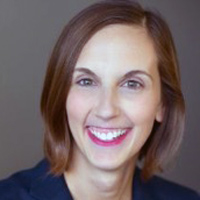Pessimists Never Prosper: Try an Abundance Mindset Instead
Even if you're a perpetual pessimist, there are ways to channel your thinking into a more positive direction, and that can help reap benefits for yourself, and for society in general.


Profit and prosper with the best of Kiplinger's advice on investing, taxes, retirement, personal finance and much more. Delivered daily. Enter your email in the box and click Sign Me Up.
You are now subscribed
Your newsletter sign-up was successful
Want to add more newsletters?

Delivered daily
Kiplinger Today
Profit and prosper with the best of Kiplinger's advice on investing, taxes, retirement, personal finance and much more delivered daily. Smart money moves start here.

Sent five days a week
Kiplinger A Step Ahead
Get practical help to make better financial decisions in your everyday life, from spending to savings on top deals.

Delivered daily
Kiplinger Closing Bell
Get today's biggest financial and investing headlines delivered to your inbox every day the U.S. stock market is open.

Sent twice a week
Kiplinger Adviser Intel
Financial pros across the country share best practices and fresh tactics to preserve and grow your wealth.

Delivered weekly
Kiplinger Tax Tips
Trim your federal and state tax bills with practical tax-planning and tax-cutting strategies.

Sent twice a week
Kiplinger Retirement Tips
Your twice-a-week guide to planning and enjoying a financially secure and richly rewarding retirement

Sent bimonthly.
Kiplinger Adviser Angle
Insights for advisers, wealth managers and other financial professionals.

Sent twice a week
Kiplinger Investing Weekly
Your twice-a-week roundup of promising stocks, funds, companies and industries you should consider, ones you should avoid, and why.

Sent weekly for six weeks
Kiplinger Invest for Retirement
Your step-by-step six-part series on how to invest for retirement, from devising a successful strategy to exactly which investments to choose.
Are you a glass-half-full or glass-half-empty kind of person?
When you think about the future, do you see limitless opportunities or multiple barriers? Do you get excited about international travel and interaction with other cultures, or do you think it’s a shame “all our U.S. jobs are going overseas”?
Be honest. Depending on your response, you either have an abundance or scarcity mindset. If you answered affirmatively to the first half of each question (i.e., glass-half-full, limitless opportunities, and excitement), you likely have an abundance mindset. Congratulations! An abundance mindset accelerates personal growth in unimaginable ways. BUT not everyone is like you.
From just $107.88 $24.99 for Kiplinger Personal Finance
Become a smarter, better informed investor. Subscribe from just $107.88 $24.99, plus get up to 4 Special Issues

Sign up for Kiplinger’s Free Newsletters
Profit and prosper with the best of expert advice on investing, taxes, retirement, personal finance and more - straight to your e-mail.
Profit and prosper with the best of expert advice - straight to your e-mail.
If you answered affirmatively to the second half of each question (i.e., glass-half-empty, multiple barriers, shameful globalization), you are probably operating under the scarcity mindset. You may be concerned that there is never enough and may feel like a victim. This article is intended for you! We’ll answer three critical questions:
- What is an abundance mindset?
- Why is it important?
- Can you change your mindset?
What is an abundance mindset?
Steven Covey’s 1989 bestseller, The Seven Habits of Highly Effective People, coined the term “abundance mentality.” An abundance mindset helps you:
- Create meaningful life experiences.
- Pursue new, interesting opportunities.
- Live a full and satisfying life.
- Find happiness even amid struggle.
- Feel inspired and creative.
People with an abundance mindset see the potential to move beyond present circumstances and have hope in a brighter future. They feel empowered, rather than frustrated and overwhelmed.
Why is an abundance mindset important?
True transformation requires an abundance mindset. As faith believers, we are called to transformation, not tweaking. One of my favorite writers is Matthew Kelly of Dynamic Catholic. Each book Matthew publishes is short but impactful. He takes a 2,700 year-old-text (the Bible) and simplifies it into powerful, digestible messages.
Matthew Kelly was the first person to help me make a connection between the abundance mindset and a spiritual focus on becoming the best version of myself. When you try to become a better version of yourself daily, you can’t help but be excited about what tomorrow holds. You think about today’s mistakes but don’t dwell on them. You treat stumbling blocks as learning experiences and move on.
An abundance mindset aids you personally and also accelerates growth on many other levels. Men become better fathers, husbands and sons. Women become better mothers, wives and daughters. Your family may notice a positive difference in you, and it might just shape their perspective on life. In the workplace, you’ll be focused and driven but will also keep your priorities aligned.
Once your family and workplace have benefitted from the “new” you, you’ll probably think about how you can use your gifts to help others in your community (or the broader world). An abundance mindset is freeing, and it’s where transformation begins.
Can mindset be changed?
The short answer is YES! The Chopra Center offers several suggestions to move into an abundance mentality, including:
- Become aware of your thoughts through mindfulness. Notice the types of thoughts circulating through your head, and make a conscious effort to shift toward abundance.
- Practice gratitude. Keep a gratitude journal, recording at least 10 items daily.
- Recognize the unlimited possibilities. Focus can be incredibly powerful but also unhelpful if your focus is too narrow and you fail to notice other possibilities.
- Cultivate and share your passions and purpose. Serve others by sharing your unique gifts and providing value.
- Think about what is going right. Human brains are wired to notice the bad more easily than the good. Take a holistic approach and play to your strengths.
We have the highest living standards of any generation in history. Our World in Data shows how global living conditions are changing. Poverty, illiteracy and childhood mortality rates have dropped significantly since 1950. Political freedoms stemming from democracy and postsecondary education rates have soared.
Yet 90% of people think the world isn’t getting better, according to Our World in Data. The news often focuses on bad events, such as terrorist attacks, natural disasters and mass shootings. It’s quite rare to see any news channel spend more than five minutes of a 30-minute show on “feel good” segments. We don’t get to see our everyday heroes on TV or in the newspapers; police officers, firefighters, teachers and missionaries make the headlines for conflict and controversy, not when things are business as usual.
Despite the good work happening in our neighborhoods and communities worldwide, 1 in 10 people today still live in extreme poverty. To solve big problems like poverty, we need to stop living in isolation and collaborate. Get behind a cause and garner support from others who are interested in advancing the same social change.
When you operate from a place of abundance, it means you are open to new opportunities. Any prior mistakes can be acknowledged and treated as a learning experience. Remember that your past isn’t a script for your future.
Profit and prosper with the best of Kiplinger's advice on investing, taxes, retirement, personal finance and much more. Delivered daily. Enter your email in the box and click Sign Me Up.

Deborah L. Meyer, CFP®, CPA/PFS, CEPA and AFCPE® Member, is the award-winning author of Redefining Family Wealth: A Parent’s Guide to Purposeful Living. Deb is the CEO of WorthyNest®, a fee-only, fiduciary wealth management firm that helps Christian parents and Christian entrepreneurs across the U.S. integrate faith and family into financial decision-making. She also provides accounting, exit planning and tax strategies to family-owned businesses through SV CPA Services.
-
 Dow Adds 1,206 Points to Top 50,000: Stock Market Today
Dow Adds 1,206 Points to Top 50,000: Stock Market TodayThe S&P 500 and Nasdaq also had strong finishes to a volatile week, with beaten-down tech stocks outperforming.
-
 Ask the Tax Editor: Federal Income Tax Deductions
Ask the Tax Editor: Federal Income Tax DeductionsAsk the Editor In this week's Ask the Editor Q&A, Joy Taylor answers questions on federal income tax deductions
-
 States With No-Fault Car Insurance Laws (and How No-Fault Car Insurance Works)
States With No-Fault Car Insurance Laws (and How No-Fault Car Insurance Works)A breakdown of the confusing rules around no-fault car insurance in every state where it exists.
-
 For the 2% Club, the Guardrails Approach and the 4% Rule Do Not Work: Here's What Works Instead
For the 2% Club, the Guardrails Approach and the 4% Rule Do Not Work: Here's What Works InsteadFor retirees with a pension, traditional withdrawal rules could be too restrictive. You need a tailored income plan that is much more flexible and realistic.
-
 Retiring Next Year? Now Is the Time to Start Designing What Your Retirement Will Look Like
Retiring Next Year? Now Is the Time to Start Designing What Your Retirement Will Look LikeThis is when you should be shifting your focus from growing your portfolio to designing an income and tax strategy that aligns your resources with your purpose.
-
 I'm a Financial Planner: This Layered Approach for Your Retirement Money Can Help Lower Your Stress
I'm a Financial Planner: This Layered Approach for Your Retirement Money Can Help Lower Your StressTo be confident about retirement, consider building a safety net by dividing assets into distinct layers and establishing a regular review process. Here's how.
-
 The 4 Estate Planning Documents Every High-Net-Worth Family Needs (Not Just a Will)
The 4 Estate Planning Documents Every High-Net-Worth Family Needs (Not Just a Will)The key to successful estate planning for HNW families isn't just drafting these four documents, but ensuring they're current and immediately accessible.
-
 Love and Legacy: What Couples Rarely Talk About (But Should)
Love and Legacy: What Couples Rarely Talk About (But Should)Couples who talk openly about finances, including estate planning, are more likely to head into retirement joyfully. How can you get the conversation going?
-
 How to Get the Fair Value for Your Shares When You Are in the Minority Vote on a Sale of Substantially All Corporate Assets
How to Get the Fair Value for Your Shares When You Are in the Minority Vote on a Sale of Substantially All Corporate AssetsWhen a sale of substantially all corporate assets is approved by majority vote, shareholders on the losing side of the vote should understand their rights.
-
 How to Add a Pet Trust to Your Estate Plan: Don't Leave Your Best Friend to Chance
How to Add a Pet Trust to Your Estate Plan: Don't Leave Your Best Friend to ChanceAdding a pet trust to your estate plan can ensure your pets are properly looked after when you're no longer able to care for them. This is how to go about it.
-
 Want to Avoid Leaving Chaos in Your Wake? Don't Leave Behind an Outdated Estate Plan
Want to Avoid Leaving Chaos in Your Wake? Don't Leave Behind an Outdated Estate PlanAn outdated or incomplete estate plan could cause confusion for those handling your affairs at a difficult time. This guide highlights what to update and when.